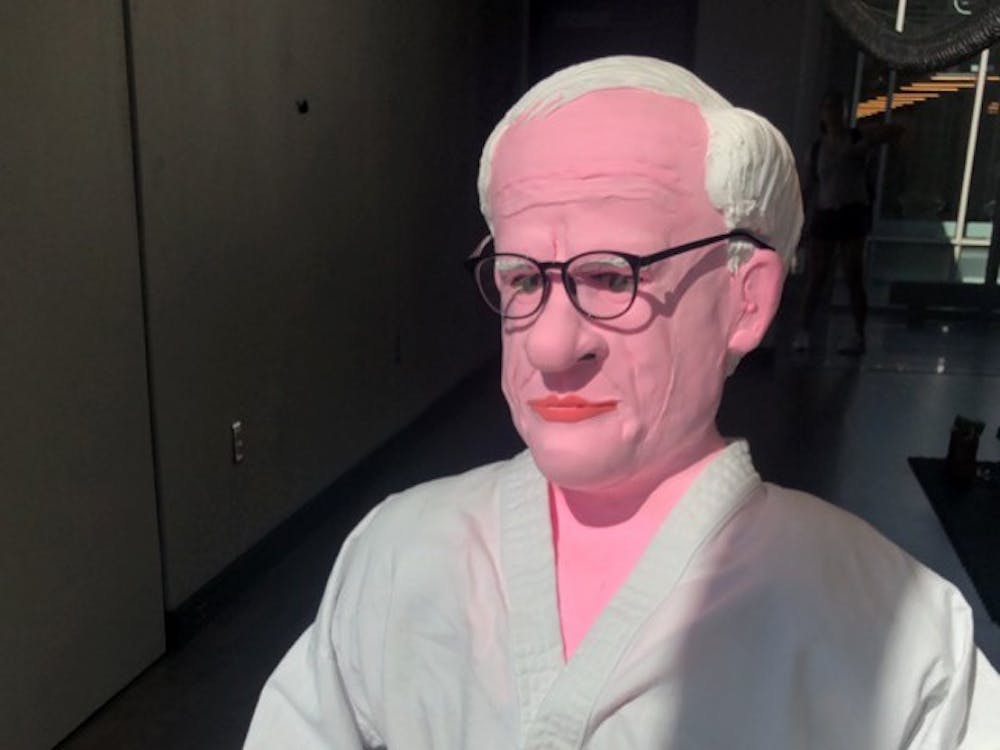It is a normal Tuesday evening commute — until, as I stare out the smudged windows of the C1, I notice something peculiar: A man is watching me. He’s seated squarely, unmoving, behind the second-floor windows of the Rubenstein Arts Center, looking out onto Campus Drive and whoever goes past.
As the bus moves closer, I realize with some reassurance that this is just a sculpture — not a real white-haired man lording over the Ruby bus stop. To its right, in flowing electric red, the words “Who owns poverty?” glow through fogged up glass.
The sculpture depicts David Rubenstein, the investor, philanthropist and former chairman of Duke’s Board of Trustees. Since co-founding The Carlyle Group, a private equity investment firm, Rubenstein has donated millions of dollars to, among many other institutions, the National Zoo, The Kennedy Center and Duke University. Now, David Rubenstein’s likeness is featured in “Who Owns Poverty in Mexico?” — a project from Mexico City-based artist Daniel Aguilar Ruvalcaba that will be on display in Gallery 235 of the Ruby from Sept. 10 to Nov. 3. “Who Owns Poverty in Mexico?” is a collaboration between Aguilar Ruvalcaba, Fuqua student Ana Neri and Ignacio Neri, the founder of a contemporary art gallery in Mexico City named NERIBarranco. Both Ana Neri and NERIBarranco contributed to the project’s production and supported it financially.
Daniel Aguilar Ruvalcaba has long explored the relationship between art and the economy. In one of his previous works, he used the money from a bank’s sponsored art grant to pay someone’s debt from that very same bank. When a friend connected him to the Rubenstein Arts Centers’ artist-in-residency program, he wasn’t immediately sure what to do — he had little reference for or knowledge of Duke — but eventually, after learning about David Rubenstein’s wealth and influence at the school, he chose the philanthropist to be the target of what he describes as a “speculative fiction.” Through visual, audio and written elements, “Who Owns Poverty in Mexico?” presents a philanthropic proposal for Rubenstein through the metaphor of an “elephant in the room.”
In the installation, silver tubing — “the trunk of the elephant” — runs from wall to ceiling to floor, twisting and turning until it reaches the ear of David Rubenstein, who is dressed in a white karate gi with a red belt that reads “Supreme.” An audio speaker at the end of the trunk recites a poem, also transcribed on one of the walls, into Rubenstein’s ear. Googly-eyed ants form a chain to show Rubenstein a graph of economic poverty in Mexico. On the other side of the room, the silver tubing attaches to an elephant head whose left eye projects “Los Olvidados” (or, “The Young and The Damned”), a classic 1950s film about poverty in Mexico.
“These little ants,” Aguilar Ruvalcaba said, “bring in front of David Rubenstein a graphic that shows poverty in Mexico from 2008 to 2018.”
This graphic was developed by CONEVAL, a Mexican government agency that generates info about poverty in the country. At a press conference at the School of Economics, UNAM, Daniel Aguilar Ruvalcaba heard the director define the graphic as a photograph. Compelled by this abstract perspective on statistics, Aguilar Ruvalcaba became interested in using the metaphor of a landscape to represent poverty.
“You have to see economic problems not in part, but as a whole forest — a panoramic view,” Aguilar Ruvalcaba said during Open Engagement, a conference at the Ruby held Sept. 14.
The allegories in the exhibit don’t end there. Rubenstein’s karate outfit indicates that he is “ready to fight poverty,” and the trunk of the “elephant in the room” whispers into his ear a concrete philanthropic proposal to do just that.
Written as a poetic letter addressed to “David,” Aguilar Ruvalcaba’s proposal playfully beseeches the millionaire philanthropist to symbolically “buy” a portion of Mexican poverty. He proposes that Rubenstein fund a single extremely impoverished Mexican for the rest of their life, thereby lifting them out of poverty. A drawing that symbolizes this philanthropic act would then, theoretically, be placed on display in the Smithsonian Museum, in which Rubenstein holds a prominent board position.
While Katy Clune, arts communication specialist at the Ruby, confirmed in an email that David Rubenstein is aware of the exhibit, Aguilar Ruvalcaba has not received any response from him.
“I know that [David Rubenstein] knows,“ Aguilar Ruvalacba said. “Because I gave him a copy of the poem, printed and digitally. But actually I don’t know if he read it.”
In the meantime, Aguilar Ruvalcaba is working on presenting a more detailed version of his proposal. This time, he has his sights set on a specific Mexican man — a 64-year-old peasant and painter from Northern Mexico — who he will ask Rubenstein to lift out of poverty.
“He doesn’t have internet, he doesn't have a phone, he doesn’t have a computer, he doesn’t have any of these things,” Aguilar Ruvalcaba said of this man, who he estimates is living on 200 pesos, or about $10, a week. “But I think that honestly [his art] has a really unique take on perspective.”
“As a middle class guy living in Mexico City, it’s really hard to make a living as an artist,” Aguilar Ruvalcaba said. “And for someone like him, that would be like even harder.”
Time will tell if David Rubenstein responds to this artist’s plea for a symbolic philanthropic gesture. Until then, Aguilar Ruvalcaba’s installation runs until Nov. 3, so explore it — ants, karate Rubenstein, elephant and all — while you still can.
Correction: This article has been updated to include the names of Aguilar Ruvalcaba’s collaborators on “Who Owns Poverty in Mexico?” The Chronicle regrets the error.
Get The Chronicle straight to your inbox
Signup for our weekly newsletter. Cancel at any time.

